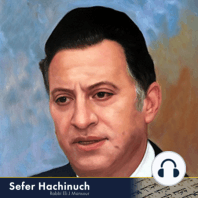20 min listen
Misva #138: The Korban Hatat (Sin-Offering)
FromSefer Hachinuch
ratings:
Length:
20 minutes
Released:
Feb 11, 2022
Format:
Podcast episode
Description
The Torah in Parashat Sav (chapter 6) introduces the procedure for bringing the Korban Hatat – the sin-offering which is required for atonement in certain situations of wrongdoing. The Ramban was of the opinion that all the various forms of sacrifices are to be counted as but a single Misva. In his view, there is one Biblical command to offer the sacrifices – the Hatat, Asham, Ola and Shelamim – and the differences between the sacrifices are merely details of this single Misva. The Sefer Ha’hinuch, however, follows the view of the Rambam, who maintained that each sacrifice constitutes a separate Misva. According to his listing, the Misva to perform the Hatat is the 138 th Biblical command. The Sefer Ha’hinuch emphasizes in his discussion of this Misva that it is futile to try to understand the underlying rationale of the Korbanot, as the true explanation lies beyond the reach of our limited comprehension. He writes that an exceptionally learned man, with a thorough knowledge of Kabbalah, might perhaps be able to arrive at some semblance of understanding of the reasons for the sacrifices. But even that is beyond the grasp of the vast majority of us, and so we should not waste our time or mental energy in the futile quest to understand the meaning behind the Korbanot. The Sefer Ha’hinuch outlines the various laws and guidelines relevant to this sacrifice. Depending on the circumstances, he writes, the Korban Hatat can be either sheep, goats, large cattle, doves or turtledoves. In some situations, individual sinners are required to offer a Hatat, but there are also occasions when a Hatat is brought on behalf of the entire nation: the goats brought as sin-offerings on Rosh Hodesh and the Yamim Tobim; in a case when the Sanhedrin issued a mistaken ruling (“Par Healem Dabar Shel Sibur”); a mistaken transgression of the entire nation of the prohibition against idolatry; and the goats brought as part of the Yom Kippur atonement service. The blood of some sin-offerings is sprinkled on the outdoor altar (“Hataot Hisoniyot”), and the blood of others is sprinkled inside the Bet Ha’mikdash, on the incense altar (“Hataot Ha’penimiyot”). In the former case, the meat of the sacrifice is eaten by the Kohanim, whereas in the latter case, the meat is brought outside the Bet Ha’mikdash and burned there. In all cases, certain portions of the Hatat are placed on the altar. These include the fats on the stomach, the kidneys, the fats on the kidneys, and a piece extending from the liver (“Yoteret Al Ha’kabed”). When a sheep is offered as a Hatat, the tail and the spinal cord are also placed on the altar. A Kohen who was to have offered a Korban Hatat and failed to do so has transgressed this Biblical command. The Gemara tells of great Rabbis who lived after the destruction of the Bet Ha’mikdash, and who mistakenly committed forbidden acts requiring a Korban Hatat. They recorded the incident in their ledger, so they would remember that when the Bet Ha’mikdash is rebuilt, they will have to offer a Hatat. In the meantime, as long as we do not have a Bet Ha’mikdash, the Rabbis have taught us that by reading and studying the verses and Mishnayot that speak about the Korban Hatat, we are considered, in some sense, as though we have actually brought the sacrifice and thereby earn atonement.
Released:
Feb 11, 2022
Format:
Podcast episode
Titles in the series (100)
Misva #8: Leaving Over Meat of the Korban Pesach: Daily Sefer Hachinuch - Brought to you by itorah.com by Sefer Hachinuch
